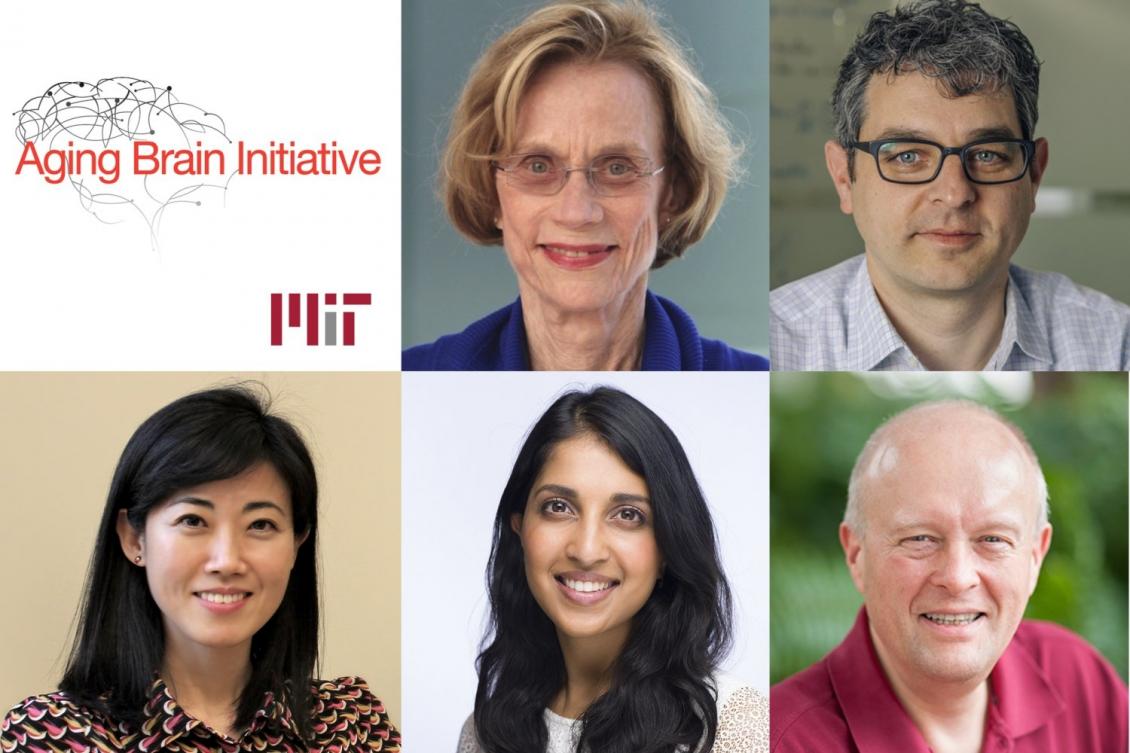Aging Brain Initiative awards fund five new ideas to study, fight neurodegeneration

Neurodegenerative diseases are defined by an increasingly widespread and debilitating death of nervous system cells, but they also share other grim characteristics: Their cause is rarely discernible and they have all eluded cures. To spur fresh, promising approaches and to encourage new experts and expertise to join the field, MIT’s Aging Brain Initiative (ABI) this month awarded five seed grants after a competition among labs across the Institute.
Founded in 2015 by nine MIT faculty members, the ABI promotes research, symposia, and related activities to advance fundamental insights that can lead to clinical progress against neurodegenerative conditions, such as Alzheimer’s disease, with an age-related onset. With an emphasis on spurring research at an early stage before it is established enough to earn more traditional funding, the ABI derives support from philanthropic gifts.
“Solving the mysteries of how health declines in the aging brain and turning that knowledge into effective tools, treatments, and technologies is of the utmost urgency given the millions of people around the world who suffer with no meaningful treatment options,” says ABI director and co-founder Li-Huei Tsai, the Picower Professor of Neuroscience in The Picower Institute for Learning and Memory and the Department of Brain and Cognitive Sciences. “We were very pleased that many groups across MIT were eager to contribute their expertise and creativity to that goal. From here, five teams will be able to begin testing their innovative ideas and the impact they could have.”
To address the clinical challenge of accurately assessing cognitive decline during Alzheimer’s disease progression and healthy aging, a team led by Thomas Heldt, associate professor of electrical and biomedical engineering in the Department of Electrical Engineering and Computer Science (EECS) and the Institute for Medical Engineering and Science, proposes to use artificial intelligence tools to bring diagnostics based on eye movements during cognitive tasks to everyday consumer electronics such as smartphones and tablets. By moving these capabilities to common at-home platforms, the team, which also includes EECS Associate Professor Vivian Sze, hopes to increase monitoring beyond what can only be intermittently achieved with high-end specialized equipment and dedicated staffing in specialists’ offices. The team will pilot their technology in a small study at Boston Medical Center in collaboration with neurosurgeon James Holsapple.
Institute Professor Ann Graybiel’s lab in the Department of Brain and Cognitive Sciences (BCS) and the McGovern Institute for Brain Research will test the hypothesis that mutations on a specific gene may lead to the early emergence of Alzheimer’s disease (AD) pathology in the striatum. That’s a a brain region crucial for motivation and movement that is directly and severely impacted by other neurodegenerative disorders including Parkinson’s and Huntington’s diseases, but that has largely been unstudied in Alzheimer’s. By editing the mutations into normal and AD-modeling mice, Research Scientist Ayano Matsushima and Graybiel hope to determine whether and how pathology, such as the accumulation of amyloid proteins, may result. Determining that could provide new insight into the progression of disease and introduce a new biomarker in a region that virtually all other studies have overlooked.
Numerous recent studies have highlighted a potential role for immune inflammation in Alzheimer’s disease. A team led by Gloria Choi, the Mark Hyman Jr. Associate Professor in BCS and The Picower Institute for Learning and Memory, will track one potential source of such activity by determining whether the brain’s meninges, which envelop the brain, becomes a means for immune cells activated by gut bacteria to circulate near the brain, where they may release signaling molecules that promote Alzheimer’s pathology. Working in mice, Choi’s lab will test whether such activity is prone to increase in Alzheimer’s and whether it contributes to disease.
A collaboration led by Peter Dedon, the Singapore Professor in MIT’s Department of Biological Engineering, will explore whether Alzheimer’s pathology is driven by dysregulation of transfer RNAs (tRNAs) and the dozens of natural tRNA modifications in the epitranscriptome, which play a key role in the process by which proteins are assembled based on genetic instructions. With Benjamin Wolozin of Boston University, Sherif Rashad of Tohoku University in Japan, and Thomas Begley of the State University of New York at Albany, Dedon will assess how the tRNA pool and epitranscriptome may differ in Alzheimer’s model mice and whether genetic instructions mistranslated because of tRNA dysregulation play a role in Alzheimer’s disease.
With her seed grant, Ritu Raman, the d’Arbeloff Assistant Professor of Mechanical Engineering, is launching an investigation of possible disruption of intercellular messages in amyotrophic lateral sclerosis (ALS), a terminal condition in which motor neuron causes loss of muscle control. Equipped with a new tool to finely sample interstitial fluid within tissues, Raman’s team will be able to monitor and compare cell-cell signaling in models of the junction between nerve and muscle. These models will be engineered from stem cells derived from patients with ALS. By studying biochemical signaling at the junction the lab hopes to discover new targets that could be therapeutically modified.
Major support for the seed grants, which provide each lab with $100,000, came from generous gifts by David Emmes SM ’76; Kathleen SM ’77, PhD ’86 and Miguel Octavio; the Estate of Margaret A. Ridge-Pappis, wife of the late James Pappis ScD ’59; the Marc Haas Foundation; and the family of former MIT President Paul Gray ’54, SM ’55, ScD ‘60, with additional funding from many annual fund donors to the Aging Brain Initiative Fund.

